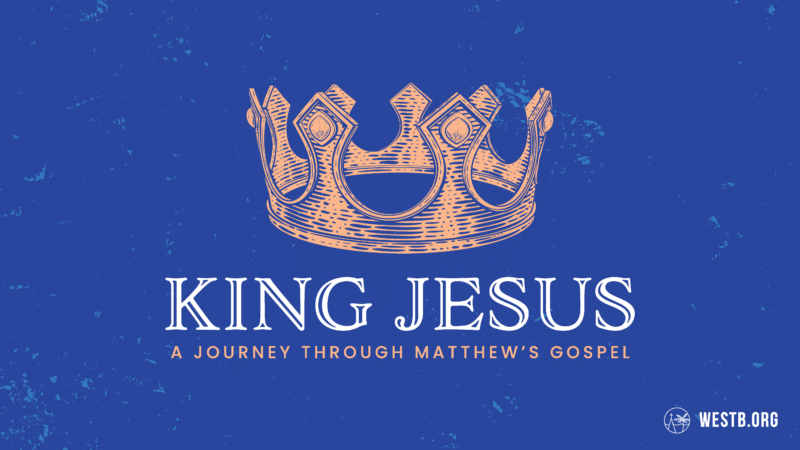The Difference Between Reconciliation and Forgiveness
Series: King Jesus
Sermon Title: The Difference Between Reconciliation and Forgiveness
Speaker: Sam Rainer
Date: September 1, 2024
Reflect
- Have you ever lost something valuable and had to go on a search to find it? How did you feel during the search?
- Can you think of a time when you needed someone else’s help to find your way, whether physically or metaphorically? What did that experience teach you?
Encounter
- What does the parable of the lost sheep (Matthew 18:12-14) reveal about God’s character and His approach toward those who have gone astray?
- How does Jesus differentiate between forgiveness and reconciliation in Matthew 18:15-20? Why is this distinction significant for our relationships?
- Why do you think Jesus included the parable of the unforgiving debtor (Matthew 18:21-35) after His teaching on forgiveness and reconciliation? What does this suggest about the connection between receiving forgiveness from God and extending it to others?
Transform
- What are some practical steps you can take this week to pursue reconciliation with someone you may have a strained relationship with? What might be the biggest challenge for you in this process?
- In what ways can our church community better embody both forgiveness and reconciliation in our relationships with each other and with those outside the church?
Additional Discussion Questions
- How do you think the idea of “collective wisdom” plays a role in helping people find their way spiritually? Can you share an example from your own life?
- What does it mean to forgive beyond your tolerance, as mentioned in the sermon? How might this challenge our usual understanding of forgiveness?
- How does understanding the cost of forgiveness (as explained in the sermon) impact the way you think about forgiving others?
Interesting Facts and Tidbits
- The Parable of the Lost Sheep:
•In Jesus’ time, shepherding was a common profession, but the job of finding lost sheep was often assigned to hired hands, not the owner. Jesus’ depiction of the shepherd personally seeking the lost sheep would have been surprising to His listeners, highlighting God’s deep personal care and love for each individual.
•Sheep are known to lack a good sense of direction and can easily wander off. This behavior serves as an apt metaphor for humans who often stray from God, sometimes without realizing it.
- Cultural Context of Forgiveness:
•In Jewish tradition, it was generally believed that one should forgive someone up to three times. When Peter asked Jesus if he should forgive “up to seven times,” he thought he was being generous. Jesus’ response of “seventy times seven” (Matthew 18:22) shattered this notion, emphasizing limitless forgiveness.
•The debt mentioned in the parable of the unforgiving debtor (Matthew 18:21-35) is enormous. The “ten thousand talents” would be equivalent to several billion dollars today, a debt that could never realistically be repaid, illustrating the vastness of God’s forgiveness.
- Reconciliation Process in Jewish Culture:
•The process Jesus outlines in Matthew 18:15-17 for resolving conflicts within the church mirrors the judicial process described in the Torah (Deuteronomy 19:15-17). This method emphasizes fairness and the importance of multiple witnesses, underscoring how serious Jesus takes reconciliation and community harmony.
- Understanding Debt in the Ancient World:
•In ancient times, debt was often a life-threatening issue. Debtors could be sold into slavery, or their families could be taken to work off what they owed. The king’s willingness to forgive such a massive debt in the parable shows God’s incredible mercy and contrasts sharply with the debtor’s refusal to forgive a comparatively small debt.
- The Role of Witnesses:
•The reference to “two or three witnesses” in Matthew 18:16 aligns with Old Testament law (Deuteronomy 19:15), where at least two or three witnesses were required to establish a matter legally. This concept ensures fairness and integrity in handling disputes, both in religious and civil contexts.
Related Passages
- Luke 15:1-7 (Parable of the Lost Sheep): Provides additional context on the theme of seeking the lost and demonstrates God’s relentless pursuit of those who have gone astray.
- Ephesians 4:32 (Forgiveness and Kindness): Offers a direct command to forgive as we have been forgiven, connecting to the sermon’s emphasis on forgiveness as a necessity for our own spiritual health.
- 2 Corinthians 5:18-19 (Ministry of Reconciliation): Explains that God reconciled us to Himself through Christ and gave us the ministry of reconciliation, aligning with the sermon’s distinction between forgiveness and reconciliation.
- Colossians 3:13 (Bearing with One Another): Calls believers to forgive grievances, which supports the application of forgiving others as Christ forgave us.
- Matthew 6:14-15 (Forgiveness and God’s Forgiveness): Jesus’ words immediately after the Lord’s Prayer, reinforcing the idea that our forgiveness from God is linked to our willingness to forgive others.

